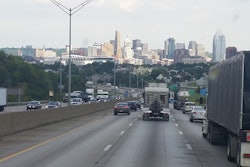A regulation-driven capacity crisis will slam trucking sometime in mid-2017 to as late as 2018, John Larkin, managing director, Stifel Financial Corporation, told fleet executives at the CCJ Spring Symposium this week. Consequently, “shippers may think this is their last chance to push prices down before they get hit with all of the regulations that will hit capacity” and drive rates up, he said.
For instance, spot markets, after holding steady through 2015, “have really softened up,” he said, with some shippers now demanding rate cuts as deep as 10 percent.
Since the Great Recession, freight rates in all sectors have continued to increase, Larkin said, with rail instituting huge price increases and truckload doing reasonably well in recent years. Intermodal and LTL have had less success on rates, Larkin said, although he predicts LTL will go through a renaissance in the coming years due in large part to the growth in e-commerce where order sizes are smaller and lend themselves to LTL.
That shift in retail from brick and mortar to e-commerce will have a big effect on trucking beyond LTL, Larkin said. At current growth rates, the share of retail handled through e-commerce is set to nearly double by 2020 to just under 15 percent market share. “That’s bad news if you’re a big carrier using distribution centers,” he said.
Another trend Larkin cited is the migration of Americans away from states that aren’t business-friendly, such as New York, Michigan and California, and to areas with greater job opportunities such as Texas, North Carolina and Florida. At the same time, more people are moving back to cities.
“This changes distribution patterns,” he said. As e-commerce expands and population density builds in cities, fulfillment centers are increasingly located in the urban core. At the same time, Amazon is going into competition with trucking, starting a truck brokerage in Chicago and buying trucks, trailers, ships and planes.
Looking to the future, Larkin pointed to Big Data and the Internet of Things as the largest game changers, citing the results of a survey of 250 transportation professionals. In the same survey, Uber for freight transportation, drones, and self-driving trucks were seen as less revolutionary over the next decade.










